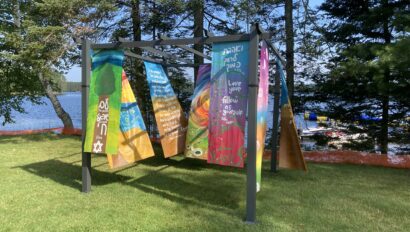The last few weeks, we have read in the weekly parshiot (Torah readings) the blueprints for the construction of the mishkan (tabernacle) that will embody God’s presence and the Israelites’ worship of God in the wilderness. This week’s Torah reading, Ki Tissa, begins with a shift from the lofty theoretical vision of the beautiful sanctuary to the mundane: how are the Israelites going to pay for its construction?
This challenge is familiar to anyone who pays any attention to … well, anything. Human beings are, by our very nature, dreamers, and yet we all live in a world of limited resources and the need for economic systems to enable us to realize our dreams. Whether it be a for-profit business, the not-for-profit world, Jewish causes, or discussions about the state and future of the country’s infrastructure, any conversation inevitably returns to the bottom line.
The Torah presents a beautiful vision for how the mishkan was evidently funded, one that, generations later, the Rabbis adopted as an annual reminder for how to support the goings on of society. In a few weeks, we will repeat the reading of the first section of Ki Tissa on Shabbat Shekalim, the first of five special Shabbatot that lead up to Passover. And the text is quite clear: we fund things through universal participation at a reasonable level for everyone to afford: the rich shall not give more, and the poor shall not give less (Exodus 30:15).
This reminder of the half Shekel commandment comes at an opportune time for our Camp Ramah in Wisconsin community. In the wake of the financial crisis of 2008 and the extended recession that followed it, our community responded in phenomenal ways to support the ability of campers to attend Ramah and the high level programming and staffing that is our calling card. In doing so, we drastically increased the amount of money we raised for scholarships (now over $250,000, not including additional contributions from Federations, synagogues, and other partners) on an annual basis while continuing to underwrite the Ramah experience for every camper through our annual campaign and targeted support of specific programs and initiatives. Because the times called for it, we made a strategic decision to focus on getting kids to camp in lieu of completing payment on the unprecedented capital investments to which we had committed ourselves. In the first decade of this century we dramatically expanded and enhanced camper cabins, staff housing, program areas, and our kitchen and dining hall, totaling more than $10 million. As a result of the economic downturn, coupled with the solidification of our partnership with the Ramah Day Camp and the mortgage undertaken to purchase that property, for the last five years we have been navigating approximately $2.5 million in debt.
Thanks to an amazing partnership with the Harvey L. Miller Family Foundation, as announced to our broader community yesterday, we have an amazing opportunity to secure the koach (strength) of Ramah Wisconsin moving forward by virtually eliminating our debt in less than two years through what we are calling the Koach Campaign. Last year, an initial matching grant eliminated $500,000; this year and next year, with your help, we will eliminate at least an additional $2 million.
The details of this matching opportunity can be found here as well as more background information, or you can find out more by contacting our Chief Development Officer, Sam Caplan (scaplan@ramahwisconsin.com).
Last week, Rabbi Mishael Zion, whose sister, father, and grandparents are all part of our Ramah Wisconsin community, laid out a Jewish argument for supporting campaigns like Koach by sharing the wisdom of his late grandfather, Rabbi Moshe Sachs, who led B’nai Emet synagogue in Minneapolis for many years. Rabbi Sachs (ז“ל), a Levite, understood the Biblical framework of supporting the Levites as a commandment to embrace our role in funding overhead, infrastructure, and debt retirement projects. You can read Mishael’s compelling piece here.
I hope that you will consider supporting Ramah Wisconsin however you can, either through our annual campaigns, a targeted gift, or by supporting the Koach Campaign. Having grown our annual number of gifts from a few hundred in the late ‘90s to over a thousand this past year, you – our parents, alumni, friends, and supporters – have increasingly adopted a version of the "half Shekel” approach introduced by Ki Tissa.
With your help we will continue to move the camp, through the successful completion of this Koach Campaign, from chayil to chayil – from strength to strength.
This challenge is familiar to anyone who pays any attention to … well, anything. Human beings are, by our very nature, dreamers, and yet we all live in a world of limited resources and the need for economic systems to enable us to realize our dreams. Whether it be a for-profit business, the not-for-profit world, Jewish causes, or discussions about the state and future of the country’s infrastructure, any conversation inevitably returns to the bottom line.
The Torah presents a beautiful vision for how the mishkan was evidently funded, one that, generations later, the Rabbis adopted as an annual reminder for how to support the goings on of society. In a few weeks, we will repeat the reading of the first section of Ki Tissa on Shabbat Shekalim, the first of five special Shabbatot that lead up to Passover. And the text is quite clear: we fund things through universal participation at a reasonable level for everyone to afford: the rich shall not give more, and the poor shall not give less (Exodus 30:15).
This reminder of the half Shekel commandment comes at an opportune time for our Camp Ramah in Wisconsin community. In the wake of the financial crisis of 2008 and the extended recession that followed it, our community responded in phenomenal ways to support the ability of campers to attend Ramah and the high level programming and staffing that is our calling card. In doing so, we drastically increased the amount of money we raised for scholarships (now over $250,000, not including additional contributions from Federations, synagogues, and other partners) on an annual basis while continuing to underwrite the Ramah experience for every camper through our annual campaign and targeted support of specific programs and initiatives. Because the times called for it, we made a strategic decision to focus on getting kids to camp in lieu of completing payment on the unprecedented capital investments to which we had committed ourselves. In the first decade of this century we dramatically expanded and enhanced camper cabins, staff housing, program areas, and our kitchen and dining hall, totaling more than $10 million. As a result of the economic downturn, coupled with the solidification of our partnership with the Ramah Day Camp and the mortgage undertaken to purchase that property, for the last five years we have been navigating approximately $2.5 million in debt.
Thanks to an amazing partnership with the Harvey L. Miller Family Foundation, as announced to our broader community yesterday, we have an amazing opportunity to secure the koach (strength) of Ramah Wisconsin moving forward by virtually eliminating our debt in less than two years through what we are calling the Koach Campaign. Last year, an initial matching grant eliminated $500,000; this year and next year, with your help, we will eliminate at least an additional $2 million.
The details of this matching opportunity can be found here as well as more background information, or you can find out more by contacting our Chief Development Officer, Sam Caplan (scaplan@ramahwisconsin.com).
Last week, Rabbi Mishael Zion, whose sister, father, and grandparents are all part of our Ramah Wisconsin community, laid out a Jewish argument for supporting campaigns like Koach by sharing the wisdom of his late grandfather, Rabbi Moshe Sachs, who led B’nai Emet synagogue in Minneapolis for many years. Rabbi Sachs (ז“ל), a Levite, understood the Biblical framework of supporting the Levites as a commandment to embrace our role in funding overhead, infrastructure, and debt retirement projects. You can read Mishael’s compelling piece here.
I hope that you will consider supporting Ramah Wisconsin however you can, either through our annual campaigns, a targeted gift, or by supporting the Koach Campaign. Having grown our annual number of gifts from a few hundred in the late ‘90s to over a thousand this past year, you – our parents, alumni, friends, and supporters – have increasingly adopted a version of the "half Shekel” approach introduced by Ki Tissa.
With your help we will continue to move the camp, through the successful completion of this Koach Campaign, from chayil to chayil – from strength to strength.





